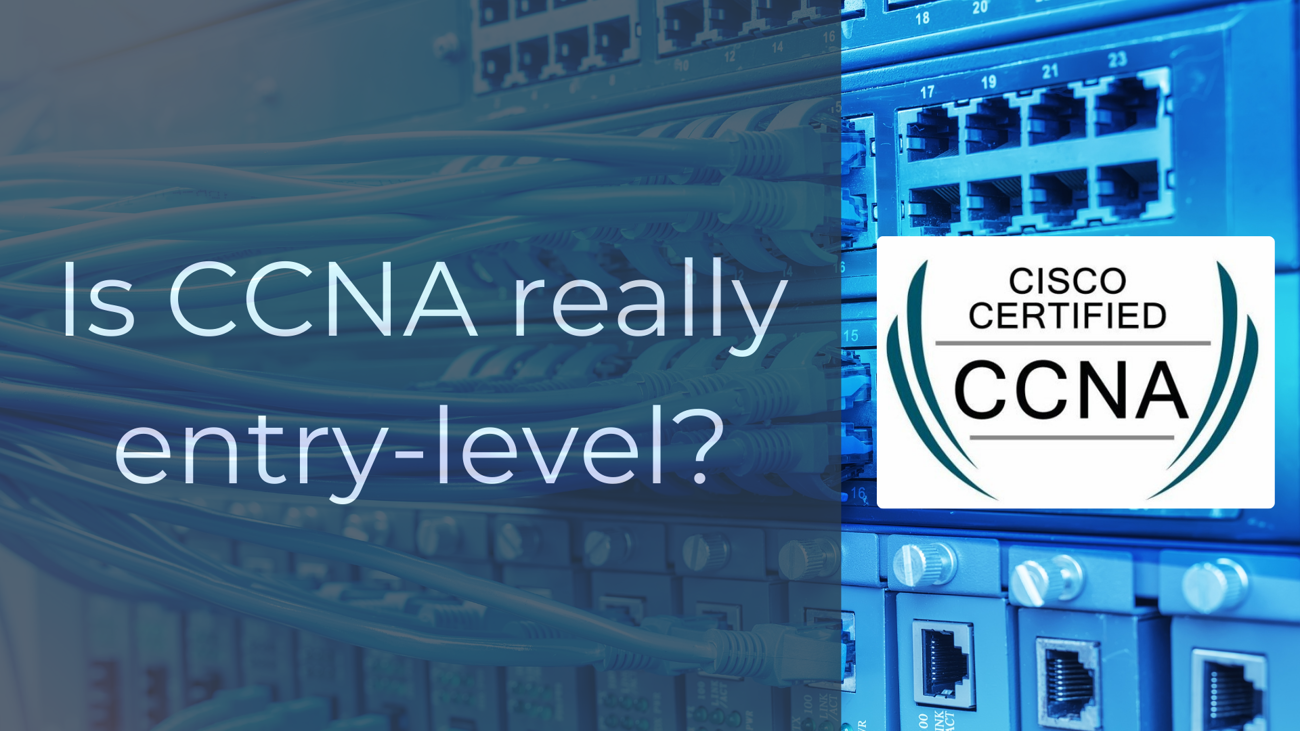Is CCNA really entry-level?

Is CCNA Really Entry-Level?
The Cisco Certified Network Associate (CCNA) certification is often described as an "entry-level" credential in IT networking. While it’s a gateway for many starting their careers, deciding whether the CCNA truly deserves its entry-level label isn’t as straightforward as it seems. With its rigorous exam, recommended background knowledge, and technical focus, the certification may be a bit more challenging than its description suggests. Let’s take a closer look at what the CCNA entails and whether beginners should approach it with caution or confidence.
Is It Really Beginner-Friendly?
"Entry-level" generally implies accessibility for those with little or no experience. In IT, certifications like CompTIA A+ or CompTIA Network+ are often held up as beginner-friendly because they focus on essentials without overwhelming the learner. They offer a starting point, teaching foundational skills in networking and IT support for those coming in fresh.
The CCNA, by comparison, demands a higher level of technical understanding. While there are no official prerequisites, Cisco recommends that candidates have prior hands-on experience with their products and a good grasp of networking basics. This recommendation signals that the certification isn’t necessarily aimed at complete newcomers. For someone stepping into IT for the first time, starting with the CCNA could feel like jumping into the deep end rather than easing into the field.
Beginners hoping to earn the CCNA need to be ready to dedicate time and effort to learning core concepts. Certifications like CompTIA Network+ may feel less overwhelming to those at square one. While the CCNA can still be achieved without prior certifications, its scope makes it clear why it’s sometimes seen as more suited to those who already have some foundational knowledge to build on.
What You Need to Know About the CCNA Exam
The CCNA exam, labeled 200-301, is well-known for covering a vast amount of ground. Candidates are expected to demonstrate their understanding of topics such as routing, switching, IP addressing, security principles, and even network automation. The exam spans 120 minutes, and within that time, it evaluates both theoretical knowledge and practical applications.
For someone with no technical background, studying for the CCNA requires more than just brushing up on basics. Concepts like configuring IPv6 routing, VLANs, or understanding the nuances of wireless network architecture can quickly become overwhelming. Additionally, newer topics like automation and software-driven networking introduce advanced layers to the certification’s requirements.
That said, success is possible for determined learners. Many online courses exist to help candidates grasp these topics, offering structured guidance through concepts that might seem daunting at first glance. For those with the right mindset, the CCNA can serve as an achievable goal. However, it’s not a certification to approach lightly, as it involves a comprehensive understanding of core networking concepts and tools.
Career Paths for CCNA Holders
The idea of a certification being "entry-level" often extends to the types of jobs it qualifies you for—and this is where the CCNA further distinguishes itself. While it can open doors to roles such as IT support specialist, network specialist, or network administrator, these roles often require more than just a baseline understanding of networking.
Take, for instance, the responsibilities of a network administrator. These professionals handle tasks such as setting up and maintaining virtual LANs (VLANs), ensuring security protocols are in place, and managing routing configurations. Similarly, network specialists are expected to troubleshoot and maintain sophisticated environments involving numerous devices and connections. These jobs may sound foundational to those in IT but can be a leap for true newcomers.
Salaries also reflect the complexity of these positions. An IT support specialist in the United States earns around $56,000 annually on average, while network specialists and administrators see higher averages, around $78,000 and $79,000 respectively. If you’re aiming for even more advanced roles, the CCNA can pave the way toward positions like network engineer or senior network engineer, which bring salaries as high as six figures. This earning potential highlights the value of the CCNA but also suggests that it prepares you for roles that go beyond traditional beginner-level expectations.
Should Beginners Start With the CCNA?
The verdict on whether the CCNA is truly entry-level depends heavily on your background and preparation. For those with prior exposure to networking—whether through work experience, academic training, or personal projects—the certification makes sense as a foundational step. It solidifies your knowledge and proves your expertise, setting you up for roles that demand a solid understanding of Cisco technologies.
However, if you’re brand new to IT, starting with the CCNA might feel overwhelming. It doesn’t mean you can’t succeed, but it does mean that you might need to put in extra effort to gain the necessary knowledge before pursuing the certification. For true newcomers, pairing CCNA studies with hands-on practice or starting with another certification such as CompTIA Network+ could make the process more manageable.
Ultimately, the CCNA challenges the traditional idea of "entry-level." While its content may put newcomers to the test, it is accessible to those who are willing to put in the effort. It remains a valuable starting point for anyone hoping to break into networking because of its recognition within the industry and the career opportunities it provides.
This story is tagged under...
CompTIA Network+ N10-009 (V9) Cisco CCNA 200-301 CompTIA A+ 220-1201 (V15) CompTIA A+ 220-1202 (V15)Interested in contributing to our blog or partnering with us? Want to share your story of how Crucial Exams helped you? Contact Us .